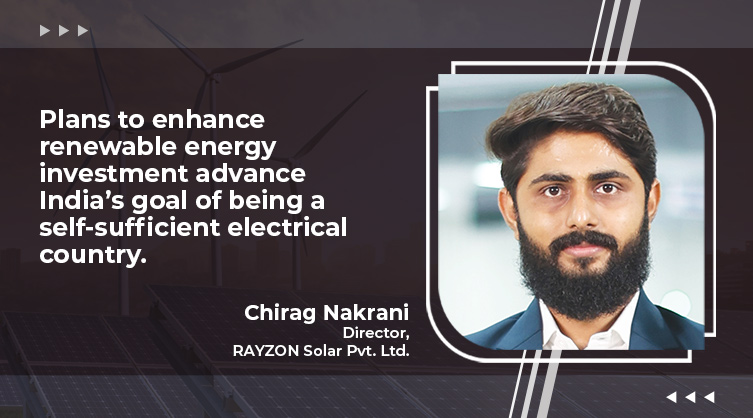Advancements in solar and wind energy point towards a promising future
By EPR Magazine Editorial March 24, 2023 3:11 pm IST
By EPR Magazine Editorial March 24, 2023 3:11 pm IST

While analysing the solar industry’s enticing potential and challenges, Chirag Nakarni, Director of Rayzon Solar, emphasises the growth trajectory of the Indian solar sector.
Could you share some of the barriers India faces in becoming a 500 GW renewable energy country, despite having 174.53 GW of renewable energy capacity, with solar accounting for 63.3 GW and wind contributing 41.9 GW?
India has made significant progress in renewable energy deployment, but several hurdles impede its transition to a 500 GW renewable energy country. One of the significant concerns is the need for more infrastructure for renewable energy production and distribution, which poses a challenge to scaling up capacity. The intermittency of renewable energy sources like solar and wind also creates obstacles to grid stability and dependability. To overcome these challenges, India must prioritise research and development, establish resilient transmission infrastructure, and encourage investments in energy storage technology. Achieving renewable energy targets also requires political and social determination.
How do government policies and regulations contribute to India’s goal of achieving self-sufficiency in electricity generation and consumption?
The government of India has established several policies and incentives to promote renewable energy sources, with ambitious targets to increase their proportion in the energy mix. Additionally, the government encourages the growth of domestic manufacturing capabilities for renewable energy equipment through subsidies and incentives. These policies and regulations create a favourable environment for investment in the renewable energy sector, contributing to India’s goal of achieving self-sufficiency in electricity generation and consumption. With regard to the ALMM extension, opinions vary on protecting the domestic industry. Still, the government will carefully consider the consequences of any policy changes to safeguard the domestic industry.
What challenges do Indian companies face while pushing and manufacturing products in India?
The availability of raw materials continues to be a significant challenge in India, particularly for producing solar panels. This results in Indian businesses relying on imports, which increases production costs. Additionally, India needs more skilled labour for solar panel production.What technologies are assisting India in developing indigenous, high-quality modules and cells?
At our company, we use advanced technologies such as PERC (Passivated Emitter and Rear Cell) in our automated production lines to produce high-quality modules that enhance the effectiveness of solar cells. We also use an auto-bussing machine to precisely control busbar soldering, programmable layout robots to accurately align cell strings, and a laser-based automatic cell cutter that uses Non-Destructive Cutting (NDC) technology.
In your opinion, what are the prospects for solar and wind energy in the industry? The industry’s future of solar and wind energy appears promising. Government policies, incentives, and India’s commitment to renewable energy and ambitious goals for solar and wind energy deployment have encouraged industry growth. Technological advances that improve efficiency and cost-effectiveness have also helped make renewable energy more competitive with traditional energy sources. Additionally, increased awareness of climate change and environmental sustainability has created a greater demand for clean energy sources, which bodes well for the future of solar and wind energy. In conclusion, the industry’s solar and wind energy prospects are positive, and we can anticipate tremendous growth in this field in the upcoming years.
For more details visit: https://www.rayzonsolar.com/
We use cookies to personalize your experience. By continuing to visit this website you agree to our Terms & Conditions, Privacy Policy and Cookie Policy.